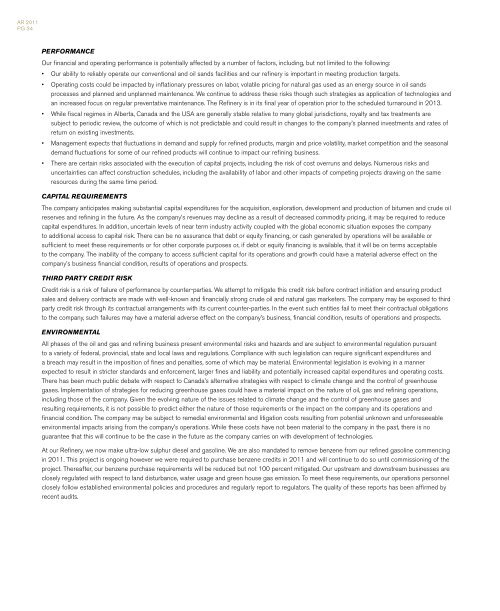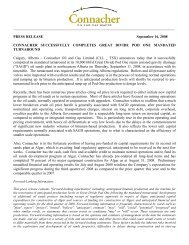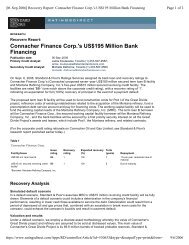ANNUAL REPORT 2011 - Connacher Oil and Gas
ANNUAL REPORT 2011 - Connacher Oil and Gas
ANNUAL REPORT 2011 - Connacher Oil and Gas
You also want an ePaper? Increase the reach of your titles
YUMPU automatically turns print PDFs into web optimized ePapers that Google loves.
AR <strong>2011</strong><br />
PG 34<br />
PERFORMANCE<br />
Our financial <strong>and</strong> operating performance is potentially affected by a number of factors, including, but not limited to the following:<br />
• Our ability to reliably operate our conventional <strong>and</strong> oil s<strong>and</strong>s facilities <strong>and</strong> our refinery is important in meeting production targets.<br />
• Operating costs could be impacted by inflationary pressures on labor, volatile pricing for natural gas used as an energy source in oil s<strong>and</strong>s<br />
processes <strong>and</strong> planned <strong>and</strong> unplanned maintenance. We continue to address these risks though such strategies as application of technologies <strong>and</strong><br />
an increased focus on regular preventative maintenance. The Refinery is in its final year of operation prior to the scheduled turnaround in 2013.<br />
• While fiscal regimes in Alberta, Canada <strong>and</strong> the USA are generally stable relative to many global jurisdictions, royalty <strong>and</strong> tax treatments are<br />
subject to periodic review, the outcome of which is not predictable <strong>and</strong> could result in changes to the company’s planned investments <strong>and</strong> rates of<br />
return on existing investments.<br />
• Management expects that fluctuations in dem<strong>and</strong> <strong>and</strong> supply for refined products, margin <strong>and</strong> price volatility, market competition <strong>and</strong> the seasonal<br />
dem<strong>and</strong> fluctuations for some of our refined products will continue to impact our refining business.<br />
• There are certain risks associated with the execution of capital projects, including the risk of cost overruns <strong>and</strong> delays. Numerous risks <strong>and</strong><br />
uncertainties can affect construction schedules, including the availability of labor <strong>and</strong> other impacts of competing projects drawing on the same<br />
resources during the same time period.<br />
CAPITAL REQUIREMENTS<br />
The company anticipates making substantial capital expenditures for the acquisition, exploration, development <strong>and</strong> production of bitumen <strong>and</strong> crude oil<br />
reserves <strong>and</strong> refining in the future. As the company’s revenues may decline as a result of decreased commodity pricing, it may be required to reduce<br />
capital expenditures. In addition, uncertain levels of near term industry activity coupled with the global economic situation exposes the company<br />
to additional access to capital risk. There can be no assurance that debt or equity financing, or cash generated by operations will be available or<br />
sufficient to meet these requirements or for other corporate purposes or, if debt or equity financing is available, that it will be on terms acceptable<br />
to the company. The inability of the company to access sufficient capital for its operations <strong>and</strong> growth could have a material adverse effect on the<br />
company’s business financial condition, results of operations <strong>and</strong> prospects.<br />
THIRD PARTY CREDIT RISK<br />
Credit risk is a risk of failure of performance by counter-parties. We attempt to mitigate this credit risk before contract initiation <strong>and</strong> ensuring product<br />
sales <strong>and</strong> delivery contracts are made with well-known <strong>and</strong> financially strong crude oil <strong>and</strong> natural gas marketers. The company may be exposed to third<br />
party credit risk through its contractual arrangements with its current counter-parties. In the event such entities fail to meet their contractual obligations<br />
to the company, such failures may have a material adverse effect on the company’s business, financial condition, results of operations <strong>and</strong> prospects.<br />
ENVIRONMENTAL<br />
All phases of the oil <strong>and</strong> gas <strong>and</strong> refining business present environmental risks <strong>and</strong> hazards <strong>and</strong> are subject to environmental regulation pursuant<br />
to a variety of federal, provincial, state <strong>and</strong> local laws <strong>and</strong> regulations. Compliance with such legislation can require significant expenditures <strong>and</strong><br />
a breach may result in the imposition of fines <strong>and</strong> penalties, some of which may be material. Environmental legislation is evolving in a manner<br />
expected to result in stricter st<strong>and</strong>ards <strong>and</strong> enforcement, larger fines <strong>and</strong> liability <strong>and</strong> potentially increased capital expenditures <strong>and</strong> operating costs.<br />
There has been much public debate with respect to Canada’s alternative strategies with respect to climate change <strong>and</strong> the control of greenhouse<br />
gases. Implementation of strategies for reducing greenhouse gases could have a material impact on the nature of oil, gas <strong>and</strong> refining operations,<br />
including those of the company. Given the evolving nature of the issues related to climate change <strong>and</strong> the control of greenhouse gases <strong>and</strong><br />
resulting requirements, it is not possible to predict either the nature of those requirements or the impact on the company <strong>and</strong> its operations <strong>and</strong><br />
financial condition. The company may be subject to remedial environmental <strong>and</strong> litigation costs resulting from potential unknown <strong>and</strong> unforeseeable<br />
environmental impacts arising from the company’s operations. While these costs have not been material to the company in the past, there is no<br />
guarantee that this will continue to be the case in the future as the company carries on with development of technologies.<br />
At our Refinery, we now make ultra-low sulphur diesel <strong>and</strong> gasoline. We are also m<strong>and</strong>ated to remove benzene from our refined gasoline commencing<br />
in <strong>2011</strong>. This project is ongoing however we were required to purchase benzene credits in <strong>2011</strong> <strong>and</strong> will continue to do so until commissioning of the<br />
project. Thereafter, our benzene purchase requirements will be reduced but not 100 percent mitigated. Our upstream <strong>and</strong> downstream businesses are<br />
closely regulated with respect to l<strong>and</strong> disturbance, water usage <strong>and</strong> green house gas emission. To meet these requirements, our operations personnel<br />
closely follow established environmental policies <strong>and</strong> procedures <strong>and</strong> regularly report to regulators. The quality of these reports has been affirmed by<br />
recent audits.












